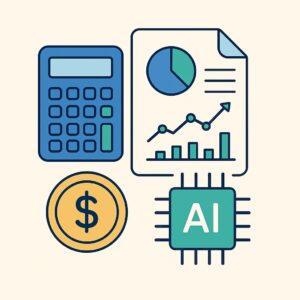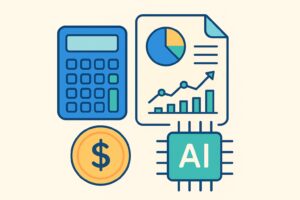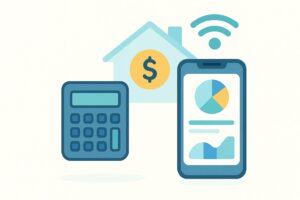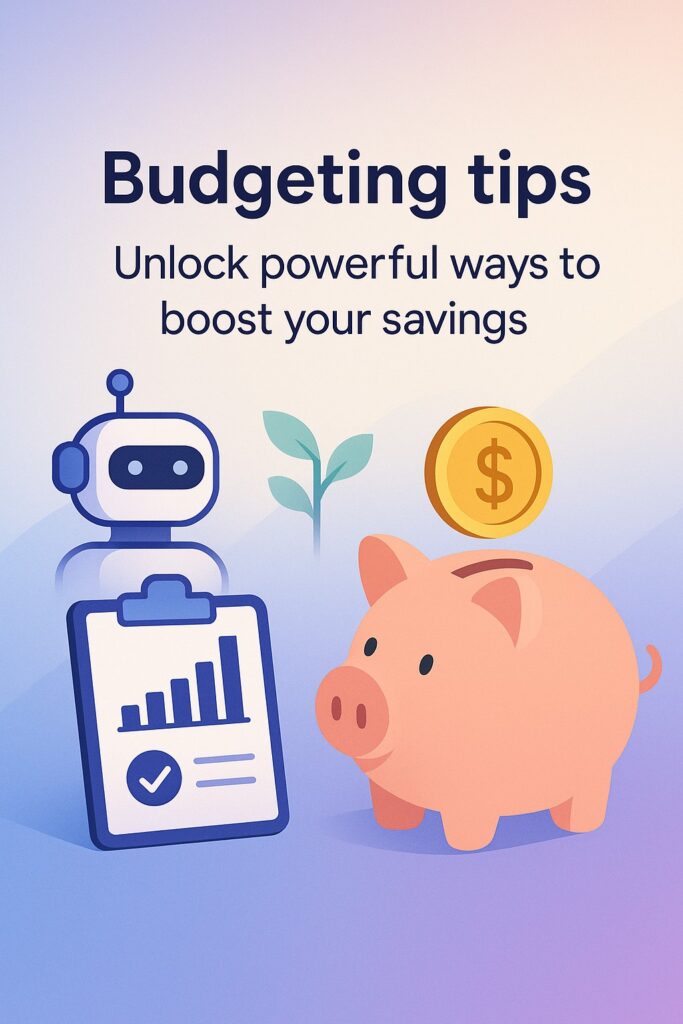Struggling to manage your money? These simple budgeting tips for beginners will help you take control, save smarter, and spend with confidence—starting today.
Starting a budget might sound boring or stressful. But trust us—it’s not as hard as it seems. If you’ve ever run out of money before the end of the month or felt confused about where your cash went, you’re not alone. That’s where budgeting tips for beginners come in.
Budgeting is simply a plan for your money. It helps you track how much you earn, how much you spend, and what you can save. Whether you get weekly allowance, part-time paychecks, or student loans, having a clear plan helps you stay in control. The good news? You don’t need to be a math expert to start. You just need a few easy habits and the right mindset.
These budgeting tips for beginners are made for students like you. They’re simple, smart, and totally doable—even if you’ve never tracked your money before. Plus, with today’s AI tools and budgeting apps, it’s easier than ever to manage your finances without feeling overwhelmed.
So if you’re ready to stop guessing and start planning, these budgeting tips for beginners will help you build strong money habits from the start. Let’s make budgeting less scary and way more useful.
Table of contents
- Budgeting tips for beginners using AI tools for budgeting
- Best budgeting apps for beginners: Tips to get started
- Smart budgeting strategies with AI for new learners
- Automated budgeting tips for beginners and students
- Budgeting tips for beginners with machine learning tools
- How to use AI for budgeting? Beginner tips that work?
- Tech tools to track expenses: Budgeting tips for beginners
- Budgeting tips for beginners using AI tools that save time
- Home budgeting with smart devices: Budgeting tips for beginners
- Beginner-friendly finance tracking apps you’ll love Budgeting tips for beginners
- Budgeting automation tools: Tips for young beginners
- AI budgeting assistants: Smart help for new budgeters
- FAQs: Budgeting tips for beginners
- Conclusion
Budgeting tips for beginners using AI tools for budgeting

Make smarter money moves with easy-to-use AI tools. Getting started with budgeting can feel overwhelming. But AI tools make it much easier. They help you track spending, set goals, and stay on top of your finances without stress. These tools work in the background, so you don’t have to do the hard math.
Understand your spending habits
AI apps like Cleo and PocketGuard break down your spending into simple charts. You’ll see where your money goes—fast food, subscriptions, online shopping, or essentials. This is one of the most helpful budgeting tips for beginners because it teaches you to spot habits early.
Set custom budgets with AI Budgeting tips for beginners
Many budgeting tools use smart suggestions. They look at your income and past expenses, then help set limits. For example, an app might suggest $50 for eating out and $30 for fun. These features make budgeting tips for beginners much more personalized and realistic.
Track everything automatically
You don’t have to enter every dollar manually. AI connects to your bank and tracks your spending automatically. This is one of the best budgeting tips for beginners because it saves time and keeps things accurate. You’ll always know how much is left in your budget.
Using AI for budgeting doesn’t mean losing control. It actually gives you more control with less effort. Try a few free apps and see which one feels right for you.
Best budgeting apps for beginners: Tips to get started
Start simple, save smarter—budgeting is easier with the right app. If you’re new to managing money, apps can be a lifesaver. They break things down, show you where your money goes, and help you stay on track. You don’t need to be a finance expert. You just need the right tools.
Try user-friendly apps first
Apps like Mint, Goodbudget, and EveryDollar are great for beginners. They’re easy to set up and show your spending in simple categories. These apps are perfect for practicing budgeting tips for beginners because they don’t feel overwhelming. Most of them offer free plans to get you started.
Set clear goals inside the app Budgeting tips for beginners
Pick a goal—like saving for a phone or tracking food expenses. These apps help you set and reach goals step by step. It’s one of the best budgeting tips for beginners to stay motivated. When you see progress, budgeting feels worth it.
Use built-in alerts to stay on track
Most apps let you set alerts when you overspend or get close to your limits. This feature is super helpful. It keeps you aware of your habits without checking the app all the time. That’s why it’s included in top budgeting tips for beginners lists everywhere.
Start with one app. Test it for a few weeks. Then adjust it as you go. You’ll get better at budgeting just by using it every day.
Smart budgeting strategies with AI for new learners

Let AI take the stress out of starting your budget. Starting to budget can feel confusing. But with AI, it gets a lot easier. These tools help you understand where your money goes and what changes you can make. It’s like having a smart money coach in your pocket.
Use AI to track your spending habits
AI budgeting tools like Cleo and YNAB study your spending over time. They automatically sort your expenses and show patterns you might miss. For example, if you always overspend on weekends, it’ll point that out. These insights are perfect budgeting tips for beginners who need help staying on track.
Let AI set realistic saving goals Budgeting tips for beginners
You don’t have to guess how much to save. AI can suggest daily or weekly savings targets based on your income. This feature gives you simple goals you can actually follow. That’s why it’s one of the most helpful budgeting tips for beginners using tech.
Get smart alerts and advice
Some AI apps send alerts when you’re about to overspend. Others give quick advice, like “Try skipping delivery this week.” These reminders are super useful. They keep things simple and focused, which is what budgeting tips for beginners should always be about.
Trying AI doesn’t mean giving up control. It just means you get support where you need it most, without all the guesswork.
Automated budgeting tips for beginners and students
Let tech do the hard part while you stay in control. Managing money doesn’t have to be overwhelming. With today’s smart tools, you can set up a budget once and let it run in the background. These automated budgeting tips for beginners and students make things simple, fast, and stress-free.
Connect your bank accounts to budgeting apps
Start by linking your accounts to apps like Mint or Monarch. These apps track your spending without you doing a thing. Every time you swipe your card, it updates your budget. This is one of the easiest automated budgeting tips for beginners and students because there’s no need to write things down or guess your balance.
Use auto-categorization for smart tracking
Many apps now sort your spending into categories like food, rent, or transport. This helps you see where your money goes at a glance. You’ll notice patterns—like how often you eat out or how much you spend on subscriptions. For automated budgeting tips for beginners and students, this feature saves time and shows you exactly where to cut back.
Set and forget your savings goals
You can also automate savings. Just pick a goal and let the app transfer small amounts regularly. It could be $2 a day or $10 a week. You won’t even notice it’s gone—but you’ll see your savings grow. These automated budgeting tips for beginners and students are great if you struggle to save manually.
Automation gives you more time to focus on school, work, or just having fun—without losing control of your finances.
Budgeting tips for beginners with machine learning tools

Let AI make your money management smarter and easier. New to budgeting? No worries. Machine learning tools can guide you without making things complicated. These tools learn from your spending and help you budget better over time. Let’s explore how they can give you a head start.
Track your habits automatically
Machine learning tools like Cleo or YNAB analyze your spending. They notice what you buy and when you buy it. Over time, they learn your habits and help you see patterns. This makes it easier to apply smart budgeting tips for beginners, especially when you don’t know where to start.
Get personalized spending insights
These tools go beyond basic tracking. They suggest what to cut, how much to save, and where to improve. That’s super helpful if you’re new to money stuff. Using budgeting tips for beginners with AI tools means you get advice that fits your actual life, not some random template.
Build smarter goals with predictive tools
Machine learning also helps you set goals. Want to save for a trip or a new laptop? These tools can predict how long it’ll take based on your income and habits. For students trying to manage on a budget, these budgeting tips for beginners can make your goals feel realistic and reachable.
Machine learning doesn’t just guess—it learns. So the more you use these tools, the better they get at helping you save. It’s like having a smart coach in your pocket.
How to use AI for budgeting? Beginner tips that work?
Simple ways AI can help you manage your money smarter. Using AI for budgeting might sound fancy, but it’s actually super easy. Whether you’re new to tracking expenses or trying to save your first $100, smart tools can guide you. Here’s how to start using AI the easy way.
Try AI-powered budget apps
Start with beginner-friendly apps like Cleo, Fyle, or Emma. These apps use AI to sort your spending into categories. You don’t have to enter everything manually. That’s why these apps work well with budgeting tips for beginners—they save time and help you understand your money habits quickly.
Let AI spot your spending trends
AI tools can highlight what you’re spending the most on—like food delivery or online shopping. This helps you make small changes that actually stick. When you’re following budgeting tips for beginners, knowing your trends is key. It’s not about cutting everything—just making smarter choices.
Use goal-based tracking Budgeting tips for beginners
Some AI tools let you set savings goals. Want to buy a laptop or pay off a small debt? The tool will show you how much to save each week. It keeps you on track without stress. These are the kinds of budgeting tips for beginners that make saving feel doable.
AI doesn’t replace your decisions—it supports them. By using smart tools now, you build better habits for the future. And it’s way less boring than using a spreadsheet!
Tech tools to track expenses: Budgeting tips for beginners

Use smart tools to see where your money goes every month. Tracking your spending is the first step to saving money. But doing it manually can get boring fast. That’s where tech tools make it easier. If you’re just starting out, there are simple apps and gadgets made for you.
Use expense tracker apps
Apps like PocketGuard, Wally, or Spendee are great for students. They connect to your bank account and show your spending in charts and categories. You don’t have to write anything down. These apps are perfect for budgeting tips for beginners because they make your money habits clear with zero stress.
Try AI-powered notifications
Some tools send alerts when you’re spending more than usual. They act like a friendly reminder to slow down. These budgeting nudges help keep you aware without feeling too strict. If you’re looking for budgeting tips for beginners, smart alerts are a game-changer.
Set limits with tech Budgeting tips for beginners
Many budgeting tools let you set spending limits on categories like food, clothes, or fun. You’ll get a quick alert when you’re getting close. This helps you stay in control, especially when you’re new to budgeting. These are the kinds of budgeting tips for beginners that really work in daily life.
Using tech makes budgeting feel modern and easy. You don’t need to be good at math—just willing to try. Start small, and let these tools do the hard work for you.
Budgeting tips for beginners using AI tools that save time
Quick tools to manage money without the stress. Starting a budget doesn’t have to take hours. With AI tools, you can make smart money moves in just minutes a day. These tools do the heavy lifting so you don’t have to.
Automate your monthly spending plan
AI budgeting apps like YNAB or Cleo can create a budget based on your income and expenses. You don’t need to guess how much to save. These apps learn your habits and update your budget as needed. For students, this is one of the easiest budgeting tips for beginners that works right away.
Get quick insights without the math
AI tools break down your spending into simple charts and alerts. They show where your money goes and suggest changes. You’ll save time by skipping the spreadsheets. If you’re new to saving, these smart insights offer valuable budgeting tips for beginners that keep you in control.
Sync and save on the go Budgeting tips for beginners
Most AI tools sync with your bank, so you can track spending in real-time. No more writing things down. This is perfect for students always on the move. Using these tools is one of the best budgeting tips for beginners who want to stay on top of things without wasting time.
In short, AI tools make budgeting fast, easy, and actually kind of fun. Try one and see how quickly your money habits start to improve.
Home budgeting with smart devices: Budgeting tips for beginners

Simple tools that make saving money easy from your home. Smart devices aren’t just for fun—they can actually help you manage your money. From voice assistants to budgeting apps on your phone, tech makes home budgeting easier than ever.
Use smart speakers to set reminders
Devices like Alexa or Google Home can remind you to check your budget or log expenses. Just say, “Set a reminder to review my spending every Sunday.” This is one of the easiest budgeting tips for beginners—no apps needed, just your voice.
Connect apps to your phone or tablet Budgeting tips for beginners
Many smart budgeting apps like PocketGuard or Goodbudget work great on mobile devices. They update in real-time and show where your money goes. For students, using these tools at home keeps money goals clear. These tools offer helpful budgeting tips for beginners right from your pocket.
Monitor expenses with connected gadgets
You can even use smart home displays to track bills or get budget alerts. Seeing your finances every day helps you stick to your plan. That’s one of the most useful budgeting tips for beginners trying to stay consistent without effort.
Smart devices make home budgeting less boring and more automatic. Start with one gadget and watch your money habits improve, one smart step at a time.
Beginner-friendly finance tracking apps you’ll love Budgeting tips for beginners
Easy apps to help you track spending and stay on budget. If you’re new to managing money, the right app can make everything easier. You don’t need a finance degree to start saving—you just need tools that work for you.
Mit: Perfect for daily expense tracking
Mint is a favorite for students. It connects to your bank account and shows your spending in real-time. It also sends alerts when you’re close to your budget. This app follows many smart budgeting tips for beginners by making everything super visual and easy to follow.
YNAB (You Need A Budget): Great for learning Budgeting tips for beginners
YNAB teaches you how to give every dollar a job. It helps you plan ahead and save for the future. It may feel a little tricky at first, but once you get it, it’s a total game-changer. Plus, it’s packed with useful budgeting tips for beginners, especially for college students who want full control of their finances.
Goodbudget: A digital envelope system
This app is based on the old-school envelope method, but it’s all digital. You set limits for categories like food, bills, and fun. It’s simple, clean, and beginner-friendly. For students trying to learn budgeting tips for beginners, Goodbudget makes saving feel like a win.
These apps keep budgeting simple and stress-free. Pick one that fits your style and start building money habits you’ll actually stick to.
Budgeting automation tools: Tips for young beginners

Make money management easier with automatic tools. Budgeting doesn’t have to be boring or confusing. If you’re new to money management, automation tools can handle the hard parts for you. They’re perfect for saving time, avoiding stress, and building smart habits early.
Use auto-categorizing apps Budgeting tips for beginners
Apps like PocketGuard and Simplifi track your spending and sort your purchases into categories. You’ll know how much you’re spending on food, subscriptions, or shopping without doing the math. This is one of the best budgeting tips for beginners because it gives you a clear picture of your habits.
Set up automatic savings
Tools like Qapital or Chime round up your purchases and move the spare change into savings. You don’t even notice it’s happening, but the savings grow fast. Many students love this feature because it works quietly in the background while you focus on other things. These small moves follow essential budgeting tips for beginners that don’t require much effort.
Get AI-powered reminders
Some apps use AI to remind you about upcoming bills or unusual spending. This helps avoid overdraft fees and keeps you on track. Getting those smart nudges is super helpful when you’re just starting out and learning all the basic budgeting tips for beginners.
With the right automation tools, budgeting becomes less of a chore and more of a smart habit. Start small, let tech do the work, and watch your money stay in control.
AI budgeting assistants: Smart help for new budgeters
Let smart assistants handle your budget so you don’t stress. If you’re just starting out with budgeting, AI assistants can make things easier. They help track your money, alert you about spending, and even suggest smart ways to save.
Try voice-enabled budgeting Budgeting tips for beginners
Some AI budgeting tools, like Cleo or Google Assistant, let you ask questions like, “How much did I spend on food this week?” or “Can I afford a new pair of shoes?” You get instant answers without digging through spreadsheets. This hands-on support offers one of the most helpful budgeting tips for beginners—make money tracking feel as easy as chatting with a friend.
Get daily spending insights
AI tools learn from your habits. Apps like Emma or Fyle send daily updates showing where your money went. If you overspent on snacks or rideshares, they’ll point it out. These insights act like real-time coaching, which is a great example of smart budgeting tips for beginners.
Use goal-based suggestions
Many AI assistants also help you reach goals faster. Want to save for a phone or a trip? The app can suggest how much to save weekly and adjust your plan if things change. These tools offer flexible, personalized budgeting tips for beginners that actually fit your student life.
With AI assistants, budgeting feels less overwhelming. They guide you step-by-step and help you learn without pressure. Start with one tool, ask it questions, and let it support your goals daily.
FAQs: Budgeting tips for beginners
What’s the easiest way to start budgeting?
Start with a simple weekly budget. List what money you get (like allowance or part-time income) and where it goes. Use free apps or a notebook. This is one of the easiest budgeting tips for beginners because it builds a habit without pressure.
How do I track spending without getting overwhelmed?
Use tech tools like budgeting apps. They sort your spending for you. Just check in daily or weekly. You don’t need to remember everything—let the app help.
How much should I save from my income?
Try the 50/30/20 rule. Use 50% of your money for needs, 30% for wants, and save 20%. If that’s too much, even saving 10% is a good start. This is a smart way to follow budgeting tips for beginners without stressing over small numbers.
What if I keep going over my budget?
Don’t worry. It happens! Check where you spent more and adjust your plan next week. Learning from mistakes is a big part of budgeting. The best budgeting tips for beginners include being flexible.
Can I budget if I only earn a small amount?
Yes! Budgeting isn’t about how much you have. It’s about how you use it. Even $10 a week can be tracked and saved. Small steps add up.
How often should I update my budget?
Every week works best. Weekly check-ins help you stay on track and catch problems early. The key to all budgeting tips for beginners is to stay consistent, even if things change.
Conclusion
Starting a budget might feel tough, but it gets easier with time. You don’t need fancy tools—just a plan and a little effort. Small steps lead to big wins. Using budgeting tips for beginners can help you stay organized, spend smarter, and reach your goals faster. Apps, AI tools, or just paper and pen—use what works for you.
The best part? You’re learning skills that will help for life. These budgeting tips for beginners aren’t just for now—they build good habits for your future.
As you explore your options, remember: every choice you make shapes your money journey. Try different budgeting tips for beginners, see what fits, and stick with it. Even if it feels slow at first, progress is still progress.



